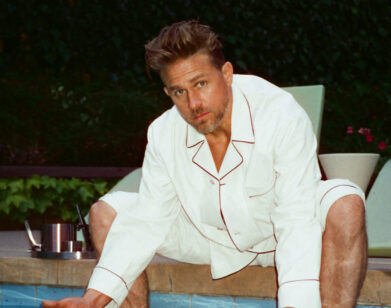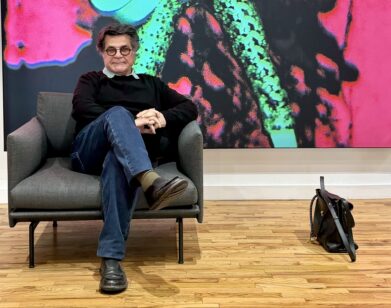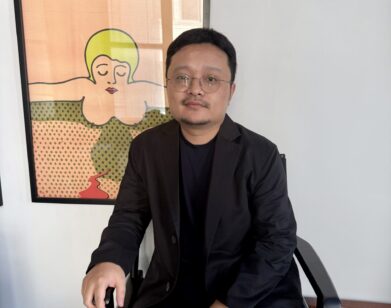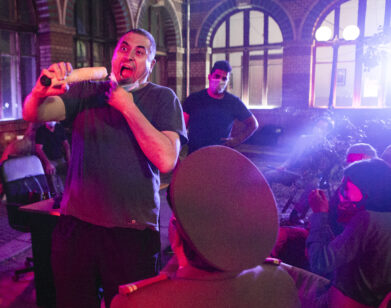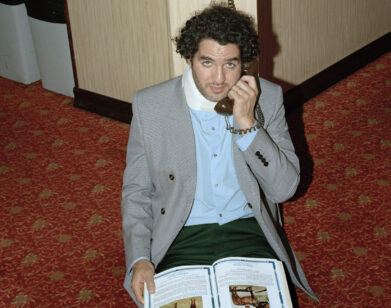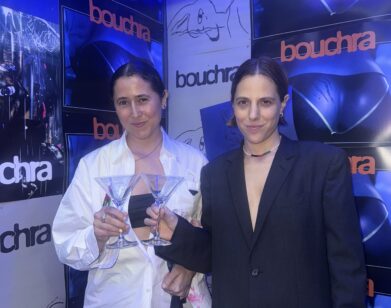Nicolas Winding Refn Revs Up
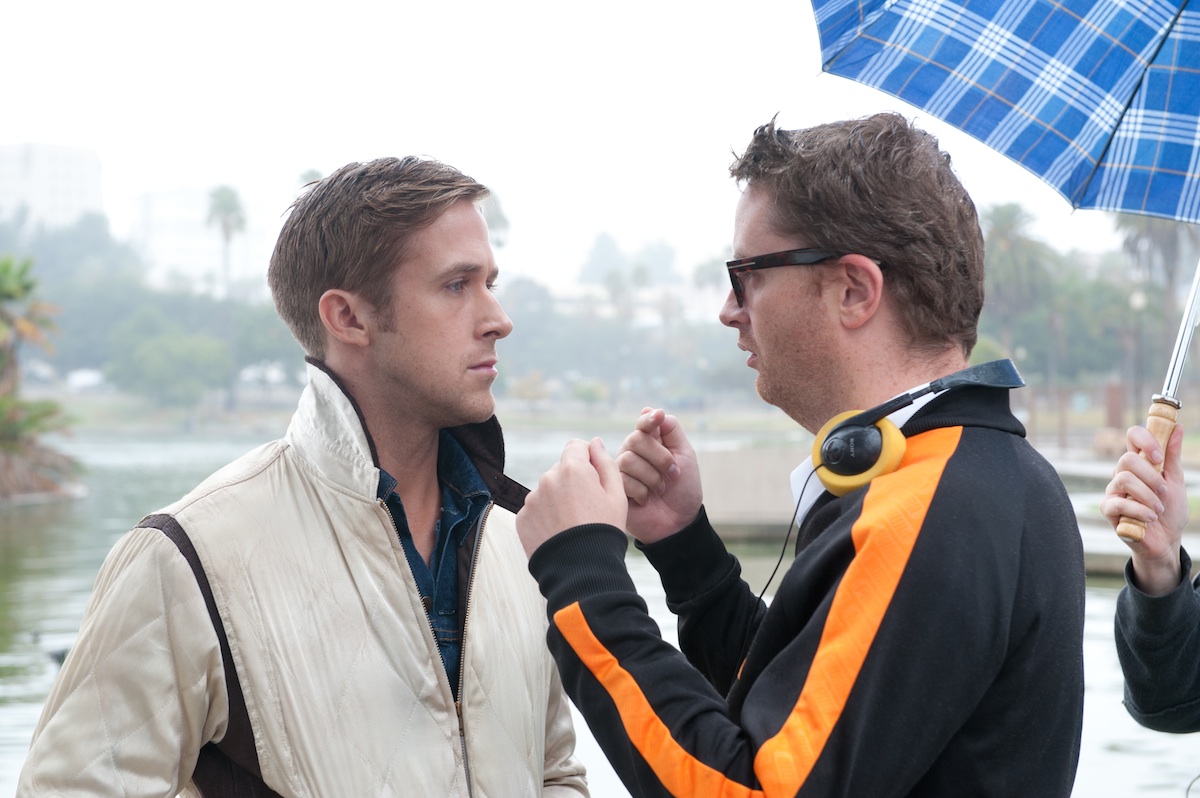
NICOLAS WINDING REFN (RIGHT) WITH RYAN GOSLING ON THE SET OF DRIVE. PHTOO COURTESY OF RICHARD FOREMAN/FILMDISTRICT
In James Sallis’s short novel, Drive, every word is accounted for. In less than two hundred pages, LA becomes “a beast by night,” and “desperate times” call for “desperate measures.” And yet, amid its noirish mystique, rapt tone, and slim size, momentum is upped. A glossary of car parts and parlance—hard lefts, spinning Impalas, cherry-red Cadillacs, airborne wheels and sideswipes—act as narrative fuel.
Wound up by Sallis’s cinematic prose, Ryan Gosling sought out director Nicolas Winding Refn (Bronson, Valhalla Rising). Since its premiere at Cannes, the actor-director duo has become a Hollywood “bromance,” nuzzling on the red carpet and declaring psychic connections in interviews. Two more collaborations are already underway for Refn and Ryan: Only God Forgives and a remake of Logan’s Run.
In Drive, Gosling plays Driver, a no-nonsense, toothpick-chewing, nearly mum stuntman who moonlights as a getaway driver for LA’s underbelly of pawnshop thieves and two-man heists. He’s a friendly giant with a superhero complex. He wears grease-stained t-shirts by day and a blood-stained satin bomber jacket by night. Off duty, he drives and listens to pop songs—Top Gun-style stretches of synth, a Chevy in place of an F-14.
Soon he meets his neighbor, innocent Irene (Carey Mulligan), a single mother whom Driver cannot help but protect. He also takes a liking to her son. The three watch TV and go on drives. But when her husband, Standard, is released early from jail, things turn grim, and incredibly violent, fast. Standard owes a debt to some gangsters, and Driver agrees to help him out. Joining the story are bad guys Bernie (Albert Brooks) and Nino (Ron Perlman), who speak in bad-guy proverbs. With little dialogue—an 80-page script turned 70-page in production—there is little room for scheming and none at all for reason or resolution. Gruesome gallantry is the name of the game, and a final death match—two shadows wrestling to the ground-a sparing last spar.
DURGA CHEW-BOSE: It’s been 15 years since you made your first film, Pusher. You were only 24, and since then, for the most part, you’ve had a steady ascent—a favorite with critics and fanboys, the trilogy and Bronson acquiring a certain cult status…
NICOLAS WINDING REFN: Well, I did crash. But it was important that I crashed.
CHEW-BOSE: But fifteen years isn’t a very long time to have achieved what you’ve achieved, and now Drive has a wide release and posters are everywhere. There’s a lot of anticipation surrounding this film. What does all this excitement feel like for you?
REFN: It’s really exciting. Absolutely. You know, filmmaking is like any kind of art form. You have to try to figure it out, and you’re going to do that by trying. It’s like teaching a child to walk. It may start by walking, but eventually it will fall. And I have kids, but I know that that will enable them to stand up again and understand why they fell, and how they can avoid that. They will walk better and faster, and stronger. Filmmaking is the same. I was able to start very young, and I was able to crash fairly young. But then I was able to stand up again knowing that I would only get better at what I was doing. You know, we live in a world where art is always looked upon as the perfect medium. We live in a society where we can alter our body parts, we can act in the most perfect or right way. A lot of that is dangerous because, especially in the world of art, the chief enemy of creativity is being safe. If you’re safe, you can’t fall and hurt yourself. The older you are, the further down the crash is going to be. But if it works out, the higher the high.
CHEW-BOSE: So you must be on a really big high right now?
REFN: Right now, everything really feels light and everybody seems to be very happy, which is always nice to hear. No matter what, if people say, “Oh but you’ve heard this before,” yes, but actually it’s really nice that people say it again. I am in a very vulnerable position, always, because I am exposing myself.
CHEW-BOSE: You mentioned your kids—have you considered making a kids’ movie? I can see you making a teen movie, too.
REFN: Absolutely. Well, I would love to make a kids’ movie. But they are very hard to make. I would love to make a teenage movie. I would love to make a romantic comedy. I want to do all kinds of genres. And I’m slowly getting there.
CHEW-BOSE: Sallis’ book is cinematic, and it’s clear why Ryan imagined this as a film. While the book is minimal and noir-inspired, there are many plot developments or bits of back story that you decided not to include. Can you talk a bit about your process in adapting Drive?
REFN: I eliminated the entire background story that the novel had, because Sallis’ book worked really well the way he decided to do it, but my movie version of the same thing, I didn’t want it. I wanted to create a more mythological hero. I had this idea to take the world of movie illusions and make a fairy tale.
CHEW-BOSE: It begins like a fairy tale. Driver’s phone call at the very beginning is his version of Once Upon a Time.
REFN: What he says is so ambiguous. It sets a tone that whatever is happening, it’s happening between heaven and hell.
CHEW-BOSE: LA is portrayed in a very specific way. Few people, oozy color and light. What are some of your favorite LA films?
REFN: Well, LA films are hard to define compared to New York films, because New York films are their own subgenre in a way. LA is more transparent. I think certainly Michael Mann is good at using Los Angeles as a prop for him. He’s one of the better ones at that. Shampoo is a really good movie about Los Angeles.
CHEW-BOSE: Yeah, it really is. Because you don’t drive, was your attraction to the story related in part to its unfamiliarity—an imagined sensation?
REFN: It’s about movement. It’s about how the character moves through a transformation. You know, driving is transforming—taking you from one place to another place. And the movie is about a man who transforms himself from being human into a superhero; something he was always meant to be. It’s his true destiny.
CHEW-BOSE: How collaborative was the project? It was Ryan who approached you, after all, so did the rest follow suit with a similarly shared energy?
REFN: Absolutely. The best thing you can do with actors is collaborate with them. My job is to inspire them to give their best. And they’re only inspired if they feel they are part of the creative process, otherwise they’ll shut down. So my goal is always to ask people what they would like to do before I even say my opinion. I usually don’t know anything until I see it. I’m a fetish filmmaker—I make films based on what I want to see.
CHEW-BOSE: Gosling is an actor who seems to be everywhere right now. Do you ever consider the effects of an overexposed actor? Is that even a concern? You have two future projects lined up with him…
REFN: No, no.
CHEW-BOSE: And you guys work really closely, right?
REFN: Yeah we’re telekinetic.
CHEW-BOSE: What does that mean?
REFN: Well just that our friendship evolved into a telekinetic relationship.
CHEW-BOSE: Can you explain that a little more?
REFN: We’re two people with one mind. It’s almost like your alter ego.
CHEW-BOSE: And you’re starting to shoot again with him soon, right?
REFN: Yeah in a couple months. We’re starting a movie right after Christmas in Bangkok, Only God Forgives.
CHEW-BOSE: And after that, Logan’s Run. Do you have ideas of what your far, far, far-away interpretation of the future looks like?
REFN: Yeah.
CHEW-BOSE: Can you share a bit of it of that vision?
REFN: No, because, I haven’t made it yet. But it arouses me, so I’m obviously excited by it. It’s something for me to know and for you to find out. I’m still working on the script; it’s at an infant stage.
CHEW-BOSE: Ok. So, let’s talk about Carey Mulligan. At first I was bit unsure of her as Irene…
REFN: Well, in the novel, she’s Hispanic…
CHEW-BOSE: You’ve mentioned that you see some hints of Molly Ringwald in her. You’re also going to work again with her. As a director, what draws you to her acting?
REFN: Working with her is terrific. She moved in to my wife’s and my house in Los Angeles and lived with us. So we became very close. She’s an amazing actress. I was meeting many other actresses, great actresses, for this role of Irene, but there was nothing for me that was clicking. And I didn’t know why because there was so much talent around me. And I never thought of Carey Mulligan for the movie. And it really came about that I got a call from her agent asking if I’d meet with her, and I hadn’t even seen any of her movies. My wife had seen An Education and so had my mother, and said it was very good. So I said, “Sure we can meet, come to the house.” Everybody had to come to the house. She came a few days later, and I was really confused, and irritated, and desperate why I couldn’t find Irene, because we were getting closer and closer to the start date. The minute she walked through the door, I said, “You’re it.”
CHEW-BOSE: What was “it” about her?
REFN: I knew that I would want to protect her. And she reminded me of my wife in a way, because she felt so pure that I could now, be the driver of the movie. I knew I could destroy anything around me to protect her.
CHEW-BOSE: Speaking of destruction, in a New York Times piece from a couple years ago, you spoke about what filmmaking used to mean for you. You likened making a movie to punk rock; a reason to destroy everything.
REFN: Yeah, it had to be a destructive medium. Pure nihilism.
CHEW-BOSE: And now you no longer feel that way…
REFN. I don’t. Thank God.
CHEW-BOSE: What do you think changed?
REFN: Well in the beginning, you use art as a destructive medium. It’s there to hurt people. But then I went bankrupt and had my first child, and I realized that art was not to hurt but to inspire. And you can get so much more out of it if you look at it like that. So when I made Bronson, I was actually making a movie about my own life.
CHEW-BOSE: A closeness to his decades in solitary confinement?
REFN: I was stuck in solitary confinement.
CHEW-BOSE: And with Drive?
REFN: It’s about how much I love my wife and what I would do for her.
CHEW-BOSE: Does she know that?
REFN: I think she suspects it.
CHEW-BOSE: Who is your next movie about, or for whom?
REFN: I don’t know who it’s for—well, I do, maybe. Only God Forgives takes place in Bangkok, and it’s about a Thai police lieutenant who believes he’s God and a gangster looking for a religion to believe in. I think everybody’s looking for religion to believe in. I think we all need faith. I shouldn’t say he’s a gangster. He’s a man having an existential journey.
CHEW-BOSE: All of your characters seem to be on journeys.
REFN: It’s all about transformation. There was a French critic last week who said to me, going from Bronson to Valhalla Rising to Drive, they’re all about transformation. So he said I’ve made a trilogy about transformation. I never thought of it like that, but he has a point.
DRIVE IS OUT IN THEATERS TODAY.

